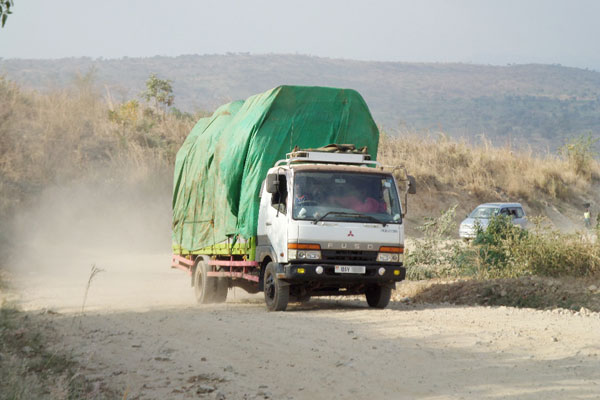Broken Nebbi -Vurra road frustrates travellers

Bad state. A truck carrying goods to the Democratic Republic of Congo makes its way up Jukia Hill along the Nebbi Goli road. This particular section of the road always becomes impassable during the rainy season. PHOTO BY ROBERT OKABA
The delayed rehabilitation of the 119km road that links Nebbi and Zombo districts to the border with DR Congo has left area residents and leaders frustrated.
According to the residents, the road, which stretches from Nebbi Town and connects to DR Congo via Goli and Zombo District, is a major trade link between the two countries, and would spur development.
However, it has remained bumpy with a lot of dust during the dry season and very muddy in the rainy season. The road also has sharp bends, especially on Jukia Hill and Ayuda connecting Paidha and Nyapea Sub-county.
Mr David Opio, a trader who says he has been using the road since 1995, claims that he has survived four accidents on it.
“You find drivers negotiating for a better bend, but end up swerving off the road. The people of Nebbi pay taxes, but this is not reciprocated in the services they receive,” he said last week.
Mr Opio explained that the road comes with enormous opportunities since it serves the people of Congo, South Sudan, Acholi, Lango, Buganda, Bunyoro and entire West Nile who use it to transact business.
Past promises
The former Zombo District chairperson, Mr John Urwiny, told Daily Monitor earlier that they have previously met the President over the road but it hasn’t been worked upon.
“The President backed our arguments to have this road tarmacked. This road links to DR Congo through Goli and Padea borders. The heavy trucks crossing to Congo have left the road in poor state and I am surprised there are no plans to tarmac it,” he said.
Ms Hellen Wiajik, a regular user of the road from Zombo District, said: “I have lost so many friends in accidents due to bad surface of the road and we appeal to the government to listen to our plea.”
Residents and those in the diaspora hailing from the area recently took to social media lamenting why the road has not be worked on despite several pleas.
Some suggested that a delegation be sent to meet the President over the matter.
President Museveni in his campaigns and official visits to West Nile has repeatedly promised to have the road repaired in vain.
During a campaign rally at Muni University grounds in November last year, he said: “I still have a debt for the road from Nebbi –Goli on the border to Paidha then to Vurra Customs. That road will have to be done. Then the road between here (Manibe) to Terego-Yumbe and then from Pakwach to Rhino camp will be done. These are the main roads to be tarmacked in West Nile.”
The road has about five connecting points to DR Congo where most Congolese rely on goods from Uganda.
This offers economic opportunities and revenue for the government as traders cross through the border customs of Goli and Padea.
Since 2018, Mutenga Batumbya (MBW) Consulting Company has been contracted by Unra to carry out a feasibility study on the road at the cost of Shs3 billion.
Economic benefits
According to Bank of Uganda 2008 survey on cross border trade, informal exports worth $2,100 million were collected through Goli customs and $2,800 million through Paidha. Informal imports amounted to $4,300 million through Paidha and $689 million through Goli, according to the report.
The exported products through these border points include petroleum, paraffin, diesel, shoes, cement, milk (powder), motorcycle parts, radios, generators, clothes, maize flour, mats, chocolate, televisions, computers, juices, sugar, soap, rice, cassava and sauce pans.




